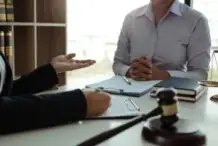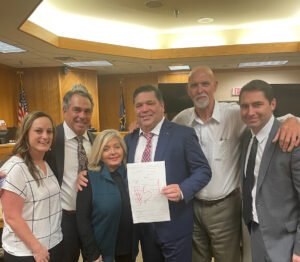
Until a judge or jury verdict is reached, a settlement can be made at any point in a personal injury case. A settlement offer can even be made at a deposition once the evidence and its indication of negligence and fault become clear. It can also be made once a deposition is complete and each party reviews the information it provided.
Because a deposition gives each side of a personal injury dispute a look into the case the other side is building, it can make important information known to both sides. While a deposition can be used as evidence in court, most personal injury cases will not go to court. Instead, the evidence will be reviewed and weighed, and both parties may reach an out-of-court settlement agreement.
What is a Deposition?
A deposition is a question-and-answer session similar to the process of providing testimony at a trial. The person being deposed (the deponent) is sworn in, placed under oath, and required to provide truthful answers. They are typically represented by a personal injury lawyer throughout the process. Not telling the truth during deposition can mean the deponent faces civil and criminal penalties.
A personal injury case can involve multiple depositions leading up to a settlement or trial. Since representatives for the plaintiff (injured party) and defendant (at-fault party) were not present at the accident or incident, a deposition can tell the story of what happened and make the sequence of events clear.
You are not likely to be the only person deposed in your case. Additional deponents can include police officers and first responders and eyewitness and expert witnesses.
Why are Depositions Taken in Personal Injury Cases?
The purpose of a deposition is to give each side of the dispute detailed information on the cause of an accident and its aftermath. The deponent will be asked questions by lawyers for both parties, each in their turn. Each side will have the opportunity to:
- Learn details about the case they may not have previously known
- Attempt to draw a clear picture of what led to the accident in question
- Learn more about the merits and limitations of each party’s case
- Assess the deponent’s testimony, demeanor, and how they might appear in court
Lawyers for either side can request a deposition to reach their own determination about how the accident occurred and who was at fault. Each side will also want to know about the injured party’s injuries and property damage and their extent, severity, and costs.
What Kind of Questions Will I Have to Answer?
A deposition can be brief, lasting an hour, or can span many hours or even days. The deponent could be asked a myriad of questions covering many topics. No one can tell you the exact questions you will be asked, but your lawyer can give you a good idea of what to expect.
Potential questions could include:
- Questions about how the accident happened and what you were doing immediately beforehand
- Questions about your injuries, including your pre- and post-accident medical history
- Questions about your property damage and its condition prior to the accident
- Questions about your job, your regular income, and your ability to return to work after the accident
Your lawyer will explain the questions you may face. They will also help you understand the importance of answering each question concisely and not adding more to your answer than you were asked.
Laborde Earles injury was great for me they took care of me very fast and professional. If for any reason I need legal help they will be who I use.
ClientHow Can a Deposition Lead to a Settlement?
The defendant or their representative in a personal injury case may make a settlement offer when the at-fault party’s negligence is clear. When the evidence significantly points toward negligence and fault, a settlement offer might follow.
In most cases, an offer will come only after a thorough review of all evidence related to your case and to its financial aftermath.
What Happens After the Deposition?
When a deposition is concluded, the questions and answers will be transcribed by the court reporter. The court reporter will provide each party’s lawyers with a transcript of the proceedings. Anyone who was present can also request a copy.
Once each side reviews the information it contains, one of two things will happen:
- Settlement negotiations could begin after your lawyer sends a demand letter of the at-fault party’s lawyer sends a settlement offer.
- Neither party offers or entertains a settlement, and your personal injury case will proceed to court.
Your lawyer will keep you updated on the aftermath of your deposition and on any developments in your case. They will inform you of the likelihood of settling your case (most cases do not go to court) or of their strategy for representing you at trial.
What Happens After a Settlement Offer Is Made?
A settlement offer does not always mean an immediate resolution. It could be only the start of the negotiation process, which can take time, and will include:
- An initial monetary offer
- A careful review of the offer
- A refusal and counteroffer
This process can be repeated multiple times until an agreement is reached by both parties. As the plaintiff, you are entitled to make the final decision to accept or reject each offer, so you, too, play an important role in what happens once an initial offer is made.
Once a settlement offer is accepted, the at-fault party has a limited time to remit payment to the law firm handling your case. The law firm will deduct their agreed-upon fee (typically a percentage of your settlement amount), and the remainder will be remitted to you.
I thank God for Digger & David. I don’t know what we would have done if it hadn’t have been for them.
Rick Smith | ClientGet Help Understanding the Deposition Process
If you or someone you love was injured in a negligence-based accident, you could be entitled to compensation. Filing a personal injury insurance claim or lawsuit could mean you are subjected to a deposition.
In many personal injury cases, a settlement can be made at or after a deposition. At Laborde Earles, we will explain the deposition process and how it can affect your case. Contact one of our team members to get started today.





